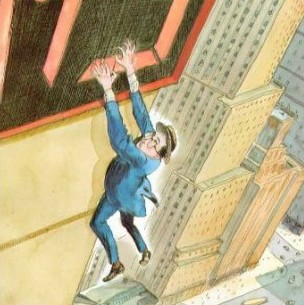 “Average is over,” Tyler Cowen told us, and in his new Foreign Affairs piece, Klaus Schwab argues that this will be increasingly true in what he terms the “Fourth Industrial Revolution,” a time when the fabric of society may be especially prone to tearing. We have already witnessed the ugly rise of nativist politics in developed nations that are growing in the aggregate but leaving behind what used to be the middle class. We’re richer, yet poorer. “A winner-takes-all economy that offers only limited access to the middle class is a recipe for democratic malaise and dereliction,” writes Schwab, asserting that only the highly skilled will thrive in this new arrangement. But I bet a lot of them will also struggle as the talents that are valued will shift frequently and violently.
“Average is over,” Tyler Cowen told us, and in his new Foreign Affairs piece, Klaus Schwab argues that this will be increasingly true in what he terms the “Fourth Industrial Revolution,” a time when the fabric of society may be especially prone to tearing. We have already witnessed the ugly rise of nativist politics in developed nations that are growing in the aggregate but leaving behind what used to be the middle class. We’re richer, yet poorer. “A winner-takes-all economy that offers only limited access to the middle class is a recipe for democratic malaise and dereliction,” writes Schwab, asserting that only the highly skilled will thrive in this new arrangement. But I bet a lot of them will also struggle as the talents that are valued will shift frequently and violently.
An excerpt:
Like the revolutions that preceded it, the Fourth Industrial Revolution has the potential to raise global income levels and improve the quality of life for populations around the world. To date, those who have gained the most from it have been consumers able to afford and access the digital world; technology has made possible new products and services that increase the efficiency and pleasure of our personal lives. Ordering a cab, booking a flight, buying a product, making a payment, listening to music, watching a film, or playing a game—any of these can now be done remotely.
In the future, technological innovation will also lead to a supply-side miracle, with long-term gains in efficiency and productivity. Transportation and communication costs will drop, logistics and global supply chains will become more effective, and the cost of trade will diminish, all of which will open new markets and drive economic growth.
At the same time, as the economists Erik Brynjolfsson and Andrew McAfee have pointed out, the revolution could yield greater inequality, particularly in its potential to disrupt labor markets. As automation substitutes for labor across the entire economy, the net displacement of workers by machines might exacerbate the gap between returns to capital and returns to labor. On the other hand, it is also possible that the displacement of workers by technology will, in aggregate, result in a net increase in safe and rewarding jobs.
We cannot foresee at this point which scenario is likely to emerge, and history suggests that the outcome is likely to be some combination of the two. However, I am convinced of one thing—that in the future, talent, more than capital, will represent the critical factor of production. This will give rise to a job market increasingly segregated into “low-skill/low-pay” and “high-skill/high-pay” segments, which in turn will lead to an increase in social tensions.
In addition to being a key economic concern, inequality represents the greatest societal concern associated with the Fourth Industrial Revolution.•
Tags: Klaus Schwab
